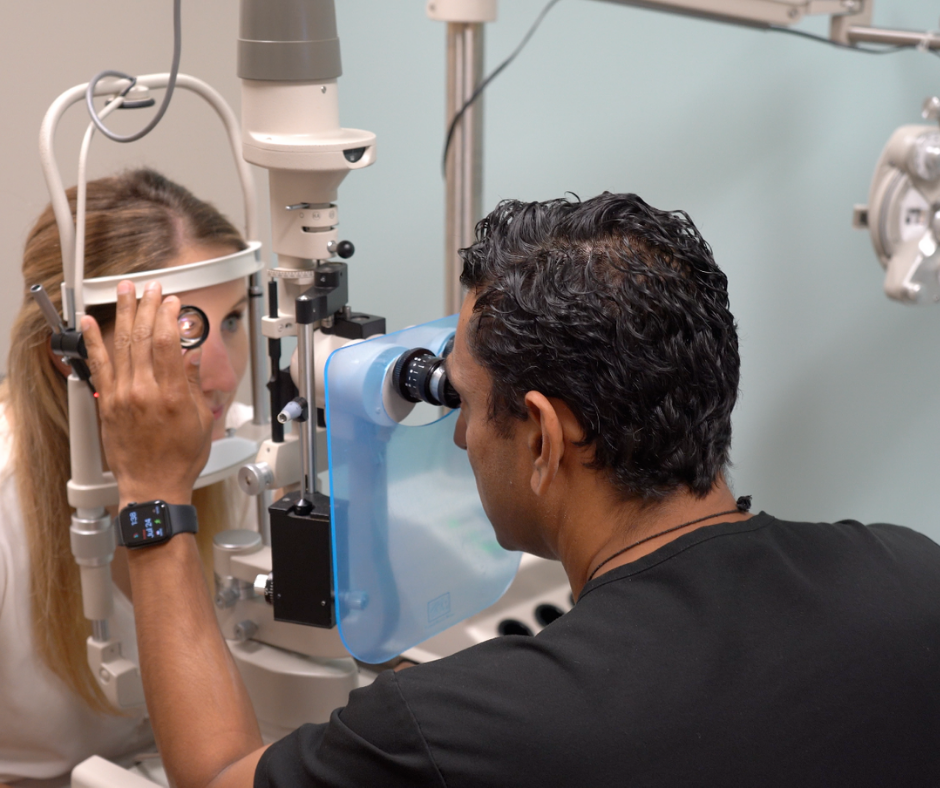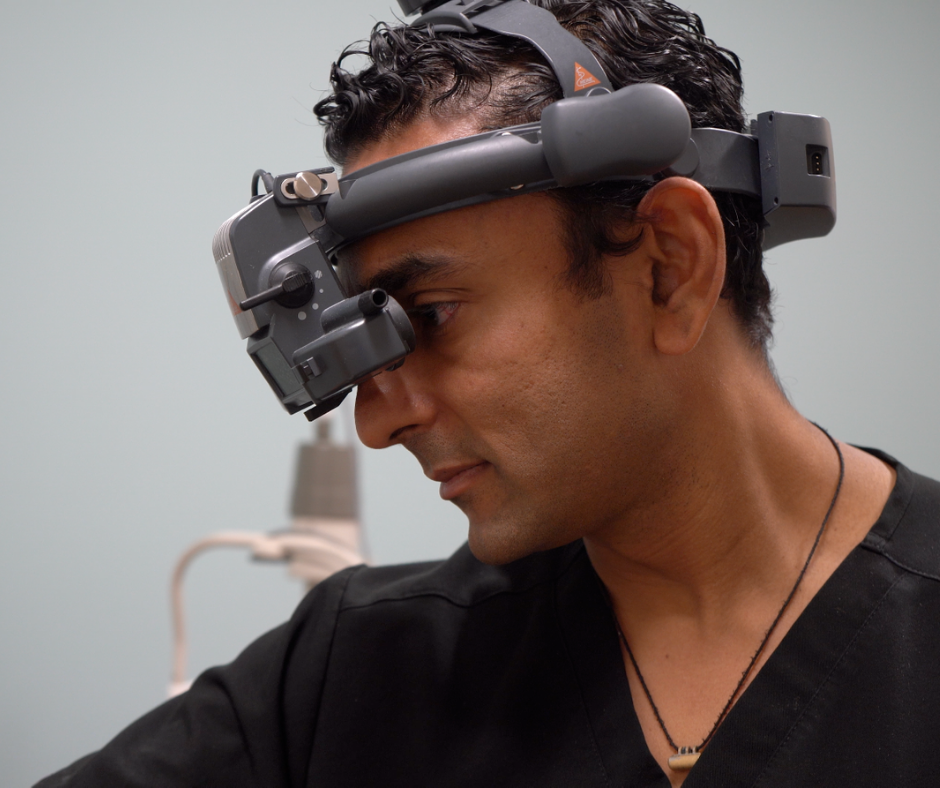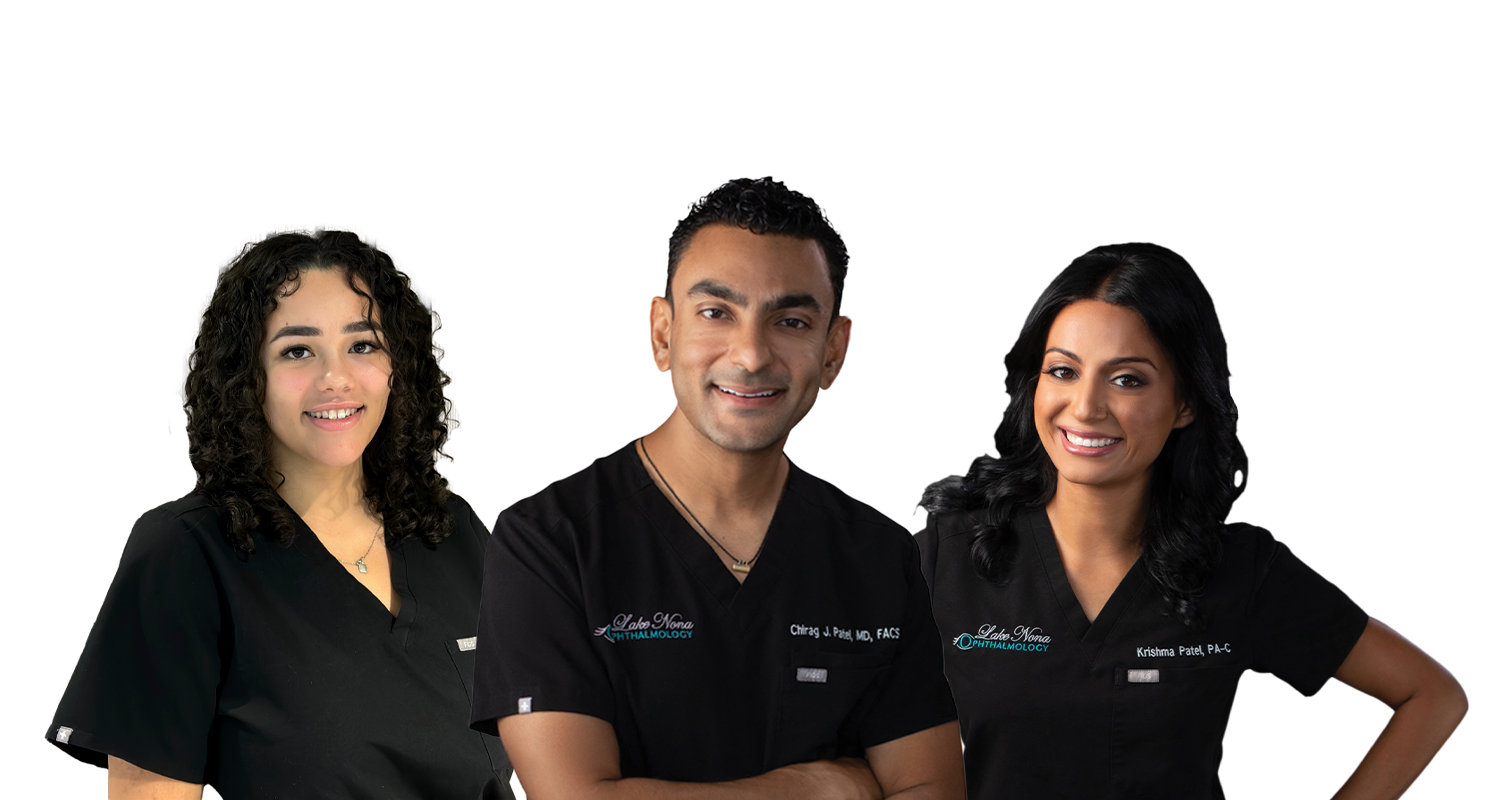- What is a cataract?
- What are the symptoms of cataracts?
- What are cataract treatment options?
- When should you see your doctor?
In the U.S., 24.4 million Americans over age 40 are affected by cataracts. The National Eye Institute reports that one-half of all Americans over age 80 have cataracts or have had the surgery to get rid of the condition.
But there is great news: cataracts can be corrected with cataract surgery that is both safe and effective.
What is a Cataract?
You’ve heard the phrase, “the lens of your eye,” which is an accurate description of how your eye works. Light rays enter through the cornea, which is the clear lens or window at the front of your eye. The cornea bends the light in a way that reflects back through the pupil and into the eye. A cataract occurs when that window gets foggy with age or illness. The cloudiness on the lens makes it harder to read, drive a car, or even see your loved ones smile at you.
Cataracts are part of the natural aging process. Chirag J. Patel, MD, FACS, board- certified ophthalmologist and founder of Lake Nona Ophthalmology tells his patients, “It’s like grey hair; if you don’t have it now, you’re going to get it at some point.” In the U.S., however, this process can be corrected safely by replacing the cloudy lens during cataract surgery.
What Are the Symptoms of Cataracts?
 Cataracts can be caused by medications or illness, but generally are the result of the natural aging process.
Cataracts can be caused by medications or illness, but generally are the result of the natural aging process.
Dr. Patel points out, “When we’re young and healthy, the lens of the eye is completely clear. As we get older, as a natural result of the aging process, and sometimes as a result of certain medications, the lens of the eye becomes cloudy and these factors can accelerate the formation of a cataract.”
While you cannot prevent cataracts, there are a few factors that can increase your risk for developing the disorder:
- Aging
- Diabetes
- Eye injury or inflammation
- Excessive alcohol consumption
- Excessive sunlight exposure
- High blood pressure
- Obesity
- Previous eye surgery
- Smoking
- Steroid use
While you can’t stop down the natural aging process, there are a few things you can do to slow down your risk for developing cataracts:
- Eat and drink healthy foods
- Have regular eye exams
- Manage any underlying health problems
- Quit smoking
- Reduce alcohol consumption
- Wear sunglasses and a hat to block the sun
Typically, cataracts happen slowly so they may “creep up” on a person. Eventually, they can interfere with your vision. Eyeglasses and stronger lighting, or eliminating driving at night are good workarounds for a while. The Mayo Clinic lists the signs and symptoms of cataracts as:
- Blurred, cloudy, or dim vision
- Colors look faded or yellow
- Double vision in one of your eyes
- Frequent changes in contact or glasses prescription
- Difficulty seeing at night
- Light and glare sensitivity
- Need for brighter reading lights
Make an appointment with your doctor if you notice any of these changes to your vision. Eventually, though, when the cataract interferes with your daily living, it might be time to consider cataract surgery.
What Are Cataract Treatment Options?
Dr. Patel says, “Cataract surgery is the treatment for a cataract.” Cataract surgery is a very common procedure in the U.S. to remove the lens of your eye and replace it with an artificial lens that will stay in place the rest of your life.
According to Dr. Patel, “Cataract surgery has advanced tremendously in terms of technology over the last 10 to 15-years.” The surgery can now be performed on an outpatient basis, and can be performed with amazing lens and laser technology to give patients independence from glasses. In most cases, you won’t even need to visit the hospital, let alone stay there overnight!
Dr. Patel says most cataract surgeries start with the consultation in his office stemming from the patient being unable to carry out their normal activities. He states, “I really believe in a customized and individualized approach to cataract surgery.” This consultation is a, “dynamic discussion between myself and the patient to make sure that the time is right to proceed to cataract surgery and to further discuss a patient’s visual goals.”
If you and your doctor determine the cataract surgery is the right option, you will start the process with a pre-operative appointment that will measure specific details of your eye using ultrasound technology. The cataract surgery itself only lasts about twenty minutes. On the day of the surgery, we will place eyedrops in your eye to dilate the pupil. You’ll receive local anesthetics to numb the area and also be given a sedative to help you relax. During the surgery, the clouded lens is removed and a clear artificial lens is implanted. Some of the types of lenses available include:
- Fixed-focal monofocal has a single focusing strength for distance vision only
- Astigmatism correction lens
- Multifocal are similar to eyeglasses with bifocal lenses that you can use both for long distance or up-close vision
- Accommodating-focus monofocal lens have a single focusing strength
You’ll be surprised at how quickly you can recover from cataract surgery. After a few days you’ll notice your vision start to improve dramatically. You’ll check in with your doctor regularly over the next month to track your healing progress. You may wear an eye patch or protective shield or have eye drops or other medications to prevent infections after the surgery.
While you may still need glasses after your cataract surgery, this is an effective and safe treatment to restore vision in the majority of people who suffer from this disorder.
When Should You See Your Doctor?
 When it comes to the progression and treatment of cataracts, there is no “one size fits all.” In most cases waiting for the right time to have your cataract surgery won’t harm your eye. If your vision is still good, you may be able to live with cataracts for many years. But every patient is different. Once you’ve been diagnosed with cataracts, it’s a good idea to ask yourself these questions to determine if surgery is the right option:
When it comes to the progression and treatment of cataracts, there is no “one size fits all.” In most cases waiting for the right time to have your cataract surgery won’t harm your eye. If your vision is still good, you may be able to live with cataracts for many years. But every patient is different. Once you’ve been diagnosed with cataracts, it’s a good idea to ask yourself these questions to determine if surgery is the right option:
- Do you have problems seeing the television or reading a book?
- Do you still feel comfortable doing your job or is your vision worsening?
- Do bright lights make it harder to see?
- Are you struggling with normal activities such as working outside, cooking, shopping or taking medications?
- Do you need help to undertake daily activities because your vision has worsened?
- Do you feel uncomfortable driving at night?
Talk to Dr. Patel and the team at Lake Nona Ophthalmology today if you’re worried about your vision due to cataracts or another condition. We’re here to help.


